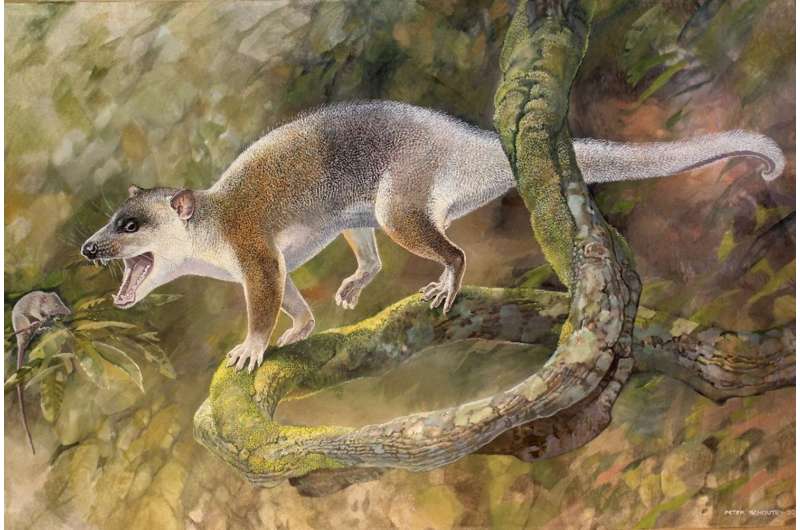Cenozoic carnivore from Turkey may have evolved without placental competitors

A new marsupial-like carnivorous animal that lived more than 40 million years ago in what is now Turkey may have evolved in the absence of competition from placental mammals, according to a study published August 16, 2017 in the open-access journal PLOS ONE by Murat Maga from University of Washington, US and Robin Beck from University of Salford, UK.
At the beginning of the Cenozoic Era, eutherians (placental mammals and their relatives) coexisted and competed with metatherians (marsupials and their relatives) in both the northern and southern hemispheres. During the Cenozoic, metatherians diversified widely in South America, Antarctica and Australia, but eutherians radiated massively and are thought to have come to outcompete metatherians and dominate the northern hemisphere.
The authors of the present study describe a nearly-complete skull and skeleton of Anatoliadelphys maasae, a cat-sized metatherian from the Uzunçar??dere Formation in Turkey. Analysis of the skeleton indicates that the animal was agile, and able to climb and grasp, perhaps similarly to a modern-day spotted quoll. Its strong jaws and large, broad premolars suggest that it was carnivorous and capable of crushing hard objects—such as bone and hard-shelled invertebrates—which would make it the first known carnivorous metatherian in the northern hemisphere from the Cenozoic Era.
The northern hemisphere had numerous cat-sized carnivorous eutherians during the Cenozoic, which may have competed with A. maasae. However, carnivorous eutherians have yet to be found in the Uzunçar??dere Formation, which was likely an island during this era. This suggests that Anatoliadelphys may have evolved in the absence of eutherian competitors, supporting the hypothesis that eutherians could outcompete metatherians where the two existed side-by-side.
"Anatoliadelphys shows that northern hemisphere metatherians were far more diverse than we previously thought - they weren't all small insect eaters," says Robin Beck.
More information: Maga AM, Beck RMD (2017) Skeleton of an unusual, cat-sized marsupial relative (Metatheria: Marsupialiformes) from the middle Eocene (Lutetian: 44-43 million years ago) of Turkey. PLoS ONE 12(8): e0181712. DOI: 10.1371/journal.pone.0181712
Journal information: PLoS ONE
Provided by Public Library of Science




















